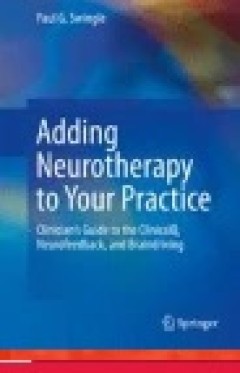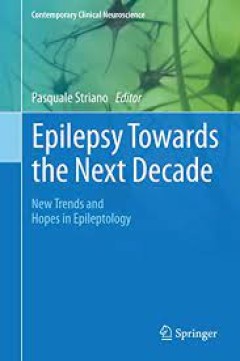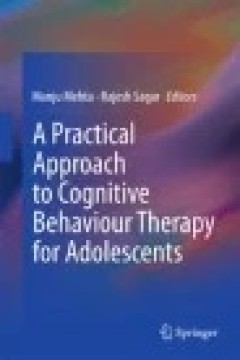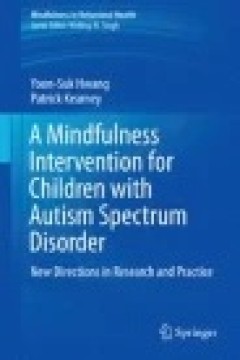Filter by

Investigations Into the Phenomenology and the Ontology of the Work of Art: Wh…
This book investigates the nature of aesthetic experience and aesthetic objects. Written by leading philosophers, psychologists, literary scholars and semioticians, the book addresses two intertwined issues. The first is related to the phenomenology of aesthetic experience: The understanding of how human beings respond to artworks, how we process linguistic or visual information, and what pr…
- Edition
- -
- ISBN/ISSN
- 978-3-319-14090-2
- Collation
- -
- Series Title
- -
- Call Number
- -

Adding Neurotherapy to Your Practice: Clinician’s Guide to the ClinicalQ, N…
This clinical manual argues for using neurotherapy to enhance mental health and medical practice across settings and specialties. The text takes readers through the tools and methods of neurotherapy: the ClinicalQ for intake assessment, a stimulated EEG modality called braindriving, and neurofeedback protocols to retrain brain function. Case studies demonstrate neurotherapy as an efficient comp…
- Edition
- Ed. 1
- ISBN/ISSN
- 978-3-319-15526-5
- Collation
- IX, 191
- Series Title
- -
- Call Number
- 615.882 SWI a

Achieving Teaching Quality in Sub-Saharan Africa: Empirical Results from Casc…
Sarah Lange examines the effectiveness of cascade training, which constitutes a cost-effective training model in teacher training. In development cooperation countries, teaching quality is expected to improve with teacher professional development; for this purpose, she explores the effectiveness of training multipliers in schools in Cameroon. This research question is analysed with a design, wh…
- Edition
- Ed. 1
- ISBN/ISSN
- 978-3-658-14683-2
- Collation
- XV, 235
- Series Title
- -
- Call Number
- 370 LAN a

Epistemological Dimensions of Evolutionary Psychology
As psychology and philosophy arose as answers to the eternal question of how the mind works, evolutionary psychology has gained ground over recent years as a link between cognitive-behavioral and natural-science theories of the mind. This provocative field has also gathered a wide range of criticisms, from attributing too much autonomy to the brain to basing itself on faulty assu…
- Edition
- -
- ISBN/ISSN
- 978-1-4939-1387-9
- Collation
- 9 b/w illustrations, 6 illustrations in colour
- Series Title
- -
- Call Number
- -

Epilepsy Towards the Next Decade New Trends and Hopes in Epileptology
A comprehensive collection of the most recent knowledge on the biological bases of various kinds of epilepsies and modern clinical approaches to their treatment. Epilepsy affects about 0.5-1% of the world's population (about 50,000,000 individuals) and the main goal of its treatment is to eliminate seizures without creating side effects. Despite numerous advances in the treatment of epilepsy an…
- Edition
- -
- ISBN/ISSN
- 978-3-319-12283-0
- Collation
- 19 b/w illustrations, 21 illustrations in colour
- Series Title
- -
- Call Number
- -

Student Well-Being in Chinese Adolescents in Hong Kong
This book reviews the theories regarding commonly occurring developmental issues among Chinese adolescents in Hong Kong, the application of Positive Youth Development (PYD) to a large-scale primary prevention program and the impact of PYD on student well-being, indexed according to adolescent developmental issue. Using multiple strategies, it presents the overall constructs and frameworks suppo…
- Edition
- -
- ISBN/ISSN
- 978-981-287-582-2
- Collation
- XVI, 348
- Series Title
- -
- Call Number
- -

PTSD and Forensic Psychology : Applications to Civil and Criminal Law
In World War I, they spoke of shell shock. By World War II, the term was battle fatigue. Modern understanding of trauma psychology has evolved to give the concept a non-military name: posttraumatic stress disorder. As such, it has been at the heart of civil and criminal cases from workers' compensation to murder. PTSD and Forensic Psychology brings its topic into real-world focus by examinin…
- Edition
- -
- ISBN/ISSN
- 978-3-319-09081-8
- Collation
- xiv, 116 halaman
- Series Title
- Springer Briefs in Psychology
- Call Number
- 345.066 019 MIL p

A Practical Guide to Implementing School-Based Interventions for Adolescents …
This innovative volume details counseling interventions for secondary students with ADHD and its associated academic and conduct problems, particularly focusing on youth at risk for developing serious disruptive behaviors. It addresses the continuing debate over counseling for youths with ADHD by identifying key elements common to reputable therapies and suggesting a framework for their success…
- Edition
- Ed. 1
- ISBN/ISSN
- 978-1-4939-3966-4
- Collation
- -
- Series Title
- -
- Call Number
- 302 SCH p

A Practical Approach to Cognitive Behaviour Therapy for Adolescents
This volume discusses adolescent mental health concerns in non-Western contexts and situations, ranging from common mental disorders to building life skills. It combines previous literature and empirical work on various disorders to provide a comprehensive account of cognitive behaviour therapy (CBT) for adolescents. The volume covers a wide spectrum of conditions, ranging from anxiety to affec…
- Edition
- Ed. 1
- ISBN/ISSN
- 978-81-322-2241-5
- Collation
- -
- Series Title
- -
- Call Number
- 616.8914 PRA p

A Mindfulness Intervention for Children with Autism Spectrum Disorders: New D…
This book presents emerging research on the effectiveness of mindfulness methods in reducing behavior problems associated with autism spectrum disorders (ASD) in children. The volume synthesizes current research and theories on the therapeutic uses of mindfulness, specifically for people living with developmental disabilities. In addition, it examines a promising new study in which mothers of c…
- Edition
- Ed. 1
- ISBN/ISSN
- 978-3-319-18962-8
- Collation
- -
- Series Title
- Mindfulness in Behavioral Health
- Call Number
- 370.15 HWA m
 Computer Science, Information & General Works
Computer Science, Information & General Works  Philosophy & Psychology
Philosophy & Psychology  Religion
Religion  Social Sciences
Social Sciences  Language
Language  Pure Science
Pure Science  Applied Sciences
Applied Sciences  Art & Recreation
Art & Recreation  Literature
Literature  History & Geography
History & Geography